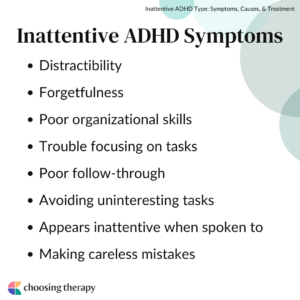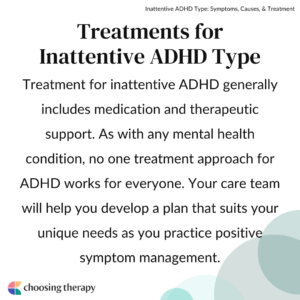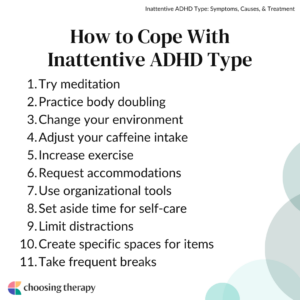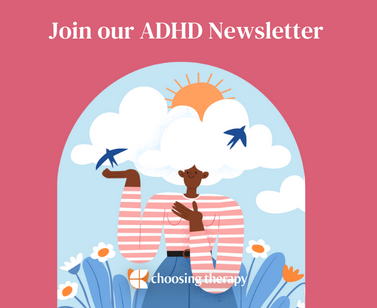Inattentive ADHD often results in difficulties concentrating, focusing on tasks, or remembering responsibilities. Many individuals with inattentive ADHD type experience distractibility and poor follow-through, contributing to academic, social, and professional challenges. Treatment typically includes a combination of therapy and medications.
ADHD Management Tools Inflow App is the #1 science-based app to help you manage your ADHD. Their support system helps you understand your neurodiverse brain and build lifelong skills. Free Trial
What Is Inattentive ADHD Type?
Inattentive ADHD, previously referred to as attention deficit disorder (ADD), is a subcategory of ADHD characterized by troubles with organization, attention to detail, and focus. Those with predominantly inattentive ADHD do not report the same hyperactive or impulsive symptoms as those experiencing the other types.
The different types of ADHD include:
- Inattentive type: Inattentive ADHD includes poor task follow-through, forgetfulness, and disorganization.
- Hyperactive/impulsive type: This type of ADHD results in difficulties with impulse control, and many people struggle with restlessness and excess energy.
- Combined type: A person with combined ADHD falls into both categories and experiences a mix of symptoms.
Inattentive ADHD Symptoms
Symptoms of inattentive ADHD vary depending on the individual, environment, and other presenting factors. Some people may struggle with symptoms that affect various aspects of their lives, while others may not feel as impacted by their ADHD.
People with inattentive ADHD can become masters at ADHD masking, meaning they learn to hide their symptoms from those around them. As with other mental health diagnoses, ADHD comes with stigma and negative stereotypes. Those with ADHD may use camouflaging techniques to fit in or avoid rejection based on their perceived deficits.
ADHD inattentive symptoms may include:
- Distractibility
- Forgetfulness
- Poor organizational skills
- Trouble focusing on tasks
- Poor follow-through
- Avoiding uninteresting tasks
- Appears inattentive when spoken to
- Making careless mistakes
Signs of Inattentive ADHD
Inattentive ADHD symptoms can be more subtle and difficult to understand, and some individuals may dismiss certain behaviors as laziness, disorganization, or messiness. People often imagine externalized hyperactivity when they think about ADHD, but inattentive ADHD results in more internalized symptoms, such as chronic patterns of poor concentration and trouble with following through on tasks.
Inattentive ADHD Type at School & Work
Parents may first note ADHD inattentive symptoms once their children enter elementary school. At this point, problems with studying, completing homework, or paying attention in class may become more apparent. ADHD inattentive symptoms in adults may occur most at work as poor task management skills, disorganized workloads, problems delegating, and overlooking crucial work-related details.
Inattentive ADHD in Relationships
In relationships, non-ADHD partners may misinterpret inattentive ADHD as rudeness or disrespect. They may feel like their partner does not listen to them or remember important details about their life. Inattentive ADHD symptoms can also affect the division of labor, as staying on top of chores, paying bills, or managing other logistics of running a household can prove challenging for the person with ADHD.
Inattentive ADHD at Home
Inattentive ADHD at home may be physically apparent by disorganization. People may struggle to keep up with everyday household tasks like laundry, dishes, and taking out the trash. In addition, they may have difficulties managing clutter or organizing their personal belongings.
Inattentive ADHD in Women Vs. Men
Research shows inattentive ADHD in adult women tends to be more prominent than in men.1 This difference may explain why girls and women are often unidentified and misdiagnosed. Many teachers and parents only associate ADHD with stereotypical hyperactive symptoms. However, both men and women can be hard on themselves and experience low self-esteem as a result of their ADHD.
What Causes ADHD Inattentive Type?
Many factors play into the development of inattentive ADHD, including genetics, environment, and even pregnancy complications.2 A predisposition can increase the risk of ADHD but does not necessarily mean someone will experience the condition.
The inattentive subtype of ADHD is typically less noticeable than the hyperactive/impulsive presentation, meaning caregivers or adults may not recognize symptoms in a child. Because of this, children with inattentive ADHD may not receive the support they need to thrive and develop. Environmental factors such as this may impact how intensely symptoms manifest in adolescence and adulthood, suggesting adequate accommodations may help prevent or limit certain challenges associated with ADHD.
ADHD inattentive type may be caused by:3,4
- Genetic factors: People with ADHD are likely to have a first-degree relative with ADHD, which may speak to genetic factors contributing to this condition.
- Pregnancy complications: Research shows being born prematurely or at a low birth weight may correlate with ADHD.
- Brain differences: Imaging studies show children with ADHD may have smaller structures in certain parts of the brain than those without ADHD. The frontal lobe may also mature a few years later for children with ADHD.
- Neurotransmitter imbalances: Some health experts believe ADHD may be due to reduced norepinephrine and dopamine levels in the brain.
- Environmental factors: Research also shows early exposure to environmental hazards like lead in utero or during infancy may correlate with ADHD.
How Is ADHD Inattentive Type Diagnosed?
Qualified clinical psychologists, psychiatrists, physicians, and other mental health professionals may diagnose Inattentive ADHD. These diagnoses tend to be multifaceted and may span over a few days. Diagnostic criteria require individuals to exhibit specific ADHD inattentive symptoms otherwise unexplained by another mental health condition.
Get Help For ADHD
Talkiatry can match you with a real psychiatrist who takes your insurance and is seeing new patients. They’re in-network with major insurers and offer medication management. Get started with a short online assessment
Inflow App – Inflow is the #1 science-based app to help you manage your ADHD. Their support system helps you understand your neurodiverse brain, and build lifelong skills. Free Trial
Treatments for Inattentive ADHD Type
Treatment for inattentive ADHD generally includes medication and therapeutic support. As with any mental health condition, no one treatment approach for ADHD works for everyone. Your care team will help you develop a plan that suits your unique needs as you practice positive symptom management.
Medication
Medication for inattentive ADHD is a frontline treatment. Many medications for ADHD are available, but many prescribers recommend stimulants first before exploring other options. Consult your physician to learn more about the side effects of ADHD medications and their intended benefits.
You may experience trial and error when finding a prescription that works for you. If you prefer an initial consultation at home, consider seeking online psychiatry options. Telehealth can be great for those with limited local resources or transportation to and from appointments.
Medications for ADHD inattentive type may include:
- Stimulants: Stimulants* like Adderall, Ritalin, and Vyvanse treat ADHD symptoms by improving focus. However, these medications can be habit-forming and often come with side effects.
- Non-stimulants: Non-stimulants** include Strattera, Guanfacine, and Clonidine for ADHD. Prescribers may recommend these medications if stimulants do not work or have unmanageable side effects.
- Antidepressants: Sometimes, antidepressants help with ADHD symptoms, particularly if someone also experiences a co-occurring mood or anxiety disorder.
*This medication has a black-box warning, the most serious kind of warning from the FDA for a risk of medication misuse or abuse.
**This medication has a black-box warning, the most serious kind of warning from the FDA for a risk of suicidal thoughts and behaviors in certain people. You should talk with your doctor about these risks before starting this medication.
Therapy
The benefits of therapy are numerous, and finding a neurodiversity-affirming therapist is helpful when living with inattentive ADHD. These specialists understand your challenges and can help you create effective strategies based on the nuances of neurodiversity. Online therapy options or support groups are also available to provide additional support.
Therapy options for ADHD inattentive type include:
- Cognitive behavioral therapy (CBT): CBT for ADHD helps clients learn how their thoughts impact their behaviors so they can make necessary changes.
- Group therapy: Group therapy offers opportunities to connect with others who experience similar issues, learn coping skills, and build a sense of community.
- Family therapy: In some cases, family therapy can be beneficial for members to work together in understanding how they can support one another and improve communication.
- Dialectical behavior therapy (DBT): DBT teaches a person to remain grounded when struggling with emotions. Mindfulness can help those with inattentive ADHD redirect their attention when feeling misguided or distracted.
- Mindfulness-based CBT (MBCT): MBCT integrates mindfulness with behavioral exercises to help people with inattentive ADHD manage their stress levels and choose adaptive ways to cope with everyday emotions.
- Life coaching: Life coaching can help with executive dysfunction by offering support and accountability via goal-setting.
- Play therapy: Play therapy alone does not typically treat ADHD but can offer children a safe place to explore their feelings with a trusted professional. This approach may also provide insight into the child’s home life or family relationships.
- Occupational therapy: Occupational therapy can help individuals manage sensitivities and disorganization issues associated with inattentive ADHD.
Complementary Treatments
Natural remedies for ADHD may prove beneficial for some individuals living with inattentive ADHD. Supplements, diet changes, exercise, or biofeedback are a few options. However, always consult your doctor before exploring alternative medicine, at-home remedies, or over-the-counter medications.
Below are complementary treatments for inattentive ADHD:5
- Fatty acids: Some randomized studies show omega-3 fatty acids may improve some ADHD symptoms.
- Exercise: Aerobic exercise and yoga show small-to-moderate effects on symptoms of inattention and impulsivity.
- Neurofeedback: Some evidence shows neurofeedback may be a beneficial approach for children with inattentive ADHD.
- Melatonin: Although research is limited, one study showed melatonin supplements can improve sleep quality and duration in people with ADHD.
- Elimination diets: Research on elimination diets is mixed, but some studies show reducing or eliminating artificial coloring, sweeteners, and sugars can be beneficial when managing inattentive ADHD.
How to Cope With Inattentive ADHD Type
Maintaining self-care may sound easy, but many people forget to pay attention to their needs when dealing with stress. However, everyone needs support, especially when working toward self-improvement and compassion.
Practicing positive coping skills can aid in symptom management as you navigate life with inattentive ADHD. Focus on remaining grounded when overwhelmed, allowing yourself to accept your symptoms as they come and go. Stay patient as you face challenges, and avoid overlooking your need for rest and rejuvenation.
Below are tips for coping with ADHD inattentive type:
- Try meditation: Meditation for ADHD encourages individuals to stay focused and grounded in the moment. A regular meditation routine can boost concentration skills across various aspects of life, so people with inattentive ADHD can better cope with their symptoms.
- Practice body doubling: Body doubling techniques can help you stay motivated when completing uninteresting tasks. Having a friend accompany you can improve motivation as you engage in parallel productivity.
- Change your environment: Sometimes, physically changing your scene can help improve focus, especially when stressed or overwhelmed.
- Adjust your caffeine intake: Caffeine may heighten anxiety and adversely affect sleep if consumed too late in the afternoon.
- Increase exercise: Physical activity can help release pent-up energy to boost focus and concentration.
- Request accommodations: Under the ADA, you are entitled to reasonable workplace accommodations for your ADHD. Talk to your boss or HR department about the best options for your situation.
- Use organizational tools: Try to automate systems as much as possible to cut the need to plan, execute, and organize.
- Set aside time for self-care: Self-care helps manage overall stress levels, allowing for more calm and mindfulness.
- Limit distractions: Distractions can exacerbate inattentive ADHD, so focus on creating an environment conducive to sustained motivation and concentration.
- Create specific spaces for items: Give everything a designated home to reduce the risk of misplacing important items.
- Take frequent breaks: Although this may seem paradoxical, scheduling breaks can actually make you more productive. Some tasks might feel less daunting when you allocate time for rest and pleasure.
How to Help a Child With ADHD Inattentive Type
Every child needs love and support from parents or caregivers, especially when learning to navigate a neurotypical world as a neurodivergent individual. You may need to change your family dynamic to incorporate healthy eating habits, routines, and communication methods that better suit your child. Listen to your child as they express themselves, ensuring you adapt to their different support needs as they develop and age.
Below are ways to support a child with inattentive ADHD:
- Develop a routine: A schedule means your child knows what to expect throughout the day. Implementing a routine can help them plan for each event, feel less anxious, and practice better transition skills.
- Limit distractions: Try to reduce or eliminate distractions, like TV or video games, during essential tasks.
- Encourage movement and play: Kids need plenty of unstructured time to burn off energy and be creative. Aim to cultivate this space daily.
- Provide clear direction: Explicitly state what you need from your child. Ask and be willing to clarify any details if they do not understand.
- Practice empathy and patience: Remain calm as much as possible. Remember, your child relies on you as a secure emotional base.
- Separate your child from their diagnosis: Your child is so much more than a diagnosis. Focus on their unique strengths and what you love the most about them, allowing yourself to recognize the benefits of their ADHD.
- Encourage them to make like-minded friends: ADHD is not a bad thing or deficit. Connect your child with peers facing similar circumstances to build support and long-lasting friendships.
- Help them explore their hobbies: Hobbies can cultivate self-esteem and bolster productivity and creativity. Encourage them to branch out and experiment with art, music, sports, or other fun activities.
- Show them how to use organization tools: Consider exploring various systems or approaches to help your child feel organized with daily tasks.
Additional Resources
To help our readers take the next step in their mental health journey, Choosing Therapy has partnered with leaders in mental health and wellness. Choosing Therapy is compensated for marketing by the companies included below.
ADHD Management Tools
Inflow App Inflow is the #1 science-based app to help you manage your ADHD. Their support system helps you understand your neurodiverse brain, and build lifelong skills. Free Trial
Online Psychiatry
Circle Medical – ADHD Diagnosis and Treatment. Affordable and accessible ADHD evaluations and treatment, including possible controlled substances medication if clinically appropriate. Diagnosis and prescription over video. Insurance accepted. Same & next day appointments available. Visit Circle Medical
Online Therapy
BetterHelp Get support and guidance from a licensed therapist. BetterHelp has over 20,000 therapists who provide convenient and affordable online therapy. Take A Free Online Assessment and get matched with the right therapist for you. Free Assessment
Free ADHD Newsletter
A free newsletter from Choosing Therapy for those impacted by ADHD. Get helpful tips and the latest information. Sign Up
Choosing Therapy Directory
You can search for therapists by specialty, experience, insurance, or price, and location. Find a therapist today
In My Experience
Do you think you have ADHD? Answer an evidence-based questionnaire for Circles Medical to learn more. Takes 45 seconds.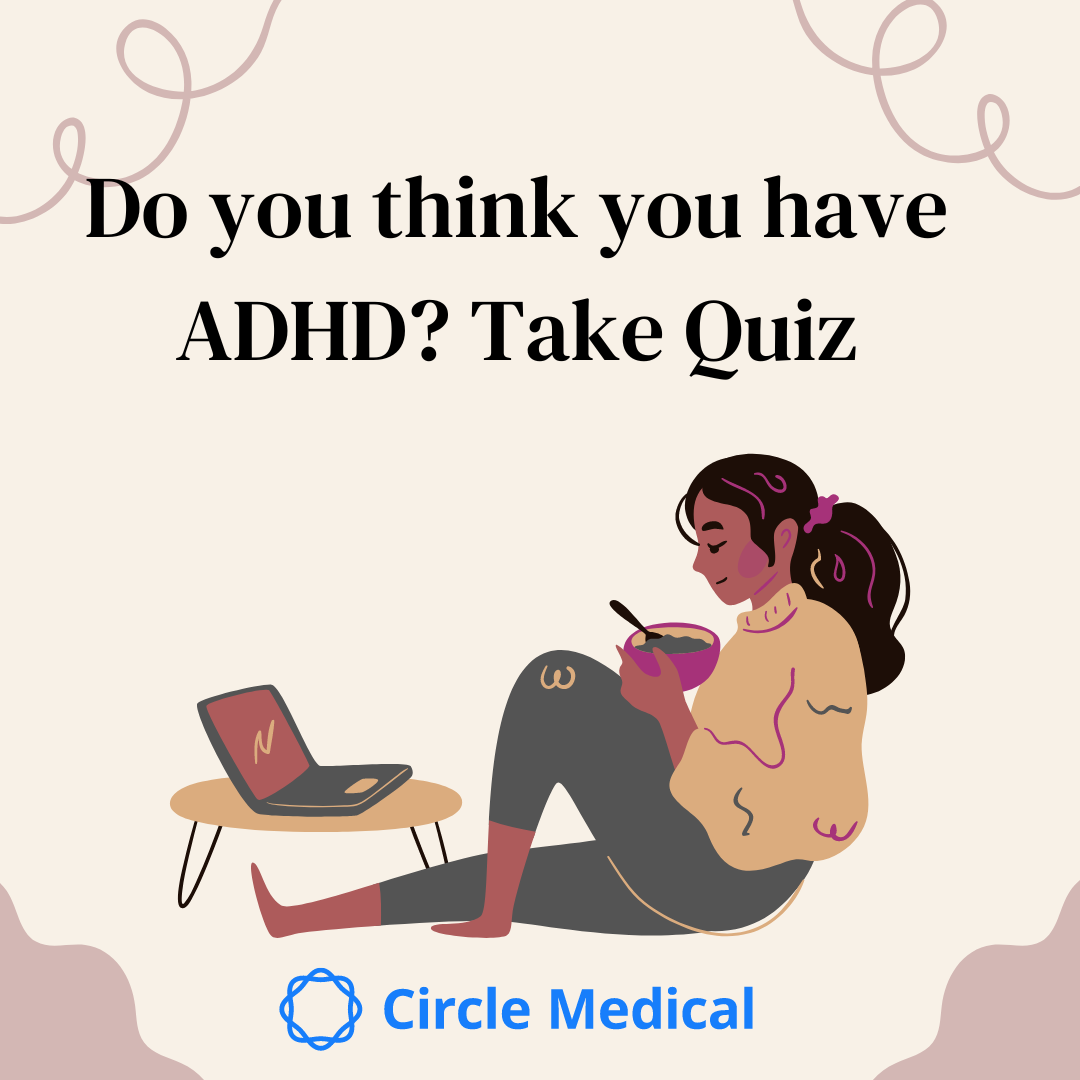
Best Online Psychiatry Services Online psychiatry, sometimes called telepsychiatry, platforms offer medication management by phone, video, or secure messaging for a variety of mental health conditions. In some cases, online psychiatry may be more affordable than seeing an in-person provider. Mental health treatment has expanded to include many online psychiatry and therapy services. With so many choices, it can feel overwhelming to find the one that is right for you.





